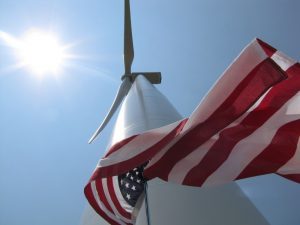
Photo source: U.S. Department of Agriculture / Flickr
The Trump administration recently released its full federal budget proposal, which could slash funding for the DOE Office of Energy Efficiency and Renewable Energy (EERE), related offices and programs, and damage a future clean energy economy. EERE has been at the forefront of supporting successful public-private partnerships and innovative, clean energy entrepreneurs. Funding that nurtures new businesses without requiring their owners to give up any stake in their companies can be make-or-break for the early-stage startups that drive innovation. When government, well-positioned to make this kind of unique investment, puts forth taxpayer dollars, it encourages the private sector to buy-in as well—often with a multiplying effect. DOE has created crucial opportunities nationwide that reduce risks for both entrepreneurs and investors, two examples being the National Incubator Initiative for Clean Energy (NIICE) and the Advanced Research Projects Agency-Energy (ARPA-E).
Dulling the cutting edge of our nation’s innovation enterprise curtails our ability to strategically lead in scientific and technological innovations in energy and across other sectors. Decelerating cleantech research, development, demonstration, and deployment would also inhibit our ability to deal responsibly with climate change and its consequences. Specifically, the President’s plan for DOE cuts FY18 funding to EERE by over $1.4 billion, down nearly 70 percent from FY16 and FY17 levels, and it lines up the $290 million ARPA-E program for elimination with an initial 93 percent reduction for FY18. These offices, programs, and labs have proven results, and to end or scale them back to virtually nothing would be a disservice to U.S. industrial competitiveness and the American people.
The administration’s harsh anti-clean energy rhetoric and its deep cutting budget proposal are signs that our Energy Department may very well lose its special and influential role at home and abroad in driving innovation. At a time when President Trump is taking the U.S. out of the Paris Climate Agreement and federal clean energy technology investments are critically and urgently needed, his budget broadly threatens our country’s booming cleantech economy and throws a wrench into our nation’s efforts to cut carbon emissions.
The good news is that clean energy continues to receive bipartisan support, and the proposed DOE cuts are widely opposed, including by at least six Republican senators and a bipartisan group of seven former EERE assistant secretaries. As stated in their letters, these leaders also recognize that our federal government has a vital role in public and private sector investments and collaboration. With local and state governments, businesses and investors, and numerous other nations stepping up to make significant cleantech commitments around the globe, now is not the time for the federal government to back down from leading the charge, abandon our history of American innovation, and jeopardize a brighter future powered by clean energy.
Thanks to the high-capital intensity, long-term time horizons, regulatory uncertainty and technical risk, there will be a significant role for the federal government to play in developing advanced energy technologies… Read more »
Thanks for the additional thoughts and links, Brad. The cuts are still looking steep for EERE: http://thehill.com/policy/energy-environment/341690-house-committee-approves-spending-bill-for-energy-water-programs and https://www.eenews.net/eenewspm/2017/07/12/stories/1060057288 As you noted there are definitely many important public benefits to federal funding in… Read more »
Regarding the 3rd question about whether private financing is alleviating the need for public financing, the answer is no. While clean energy is now cost competitive with dirty energy and… Read more »
A good reminder in your initial comment here, Dan, that the bigger picture goal is crucial and that the context at that the scale of the problems and of the… Read more »
I oppose subsidization of sources of energy on the grounds that currently available climate models supply a regulatory agency with no information. Absent information, a regulatory agency cannot regulate. Today’s… Read more »
Your comment makes no sense. We know about the reality of climate change via many, many lines of evidence, not just models. And the models actually do have good predictive… Read more »
Dan Miller: Thank you for taking the time to reply. You’ve made a number of assertions but have proven none of them. To prove an assertion you’d have to compose… Read more »
Terry: You still are not making any sense, but I will not reply further as you are off-topic and appear to be trolling.
Dan Miller: In your reply I note that you change the topic from global warming policy to me. This makes of your argument an example of an ad hominem argument. As you… Read more »